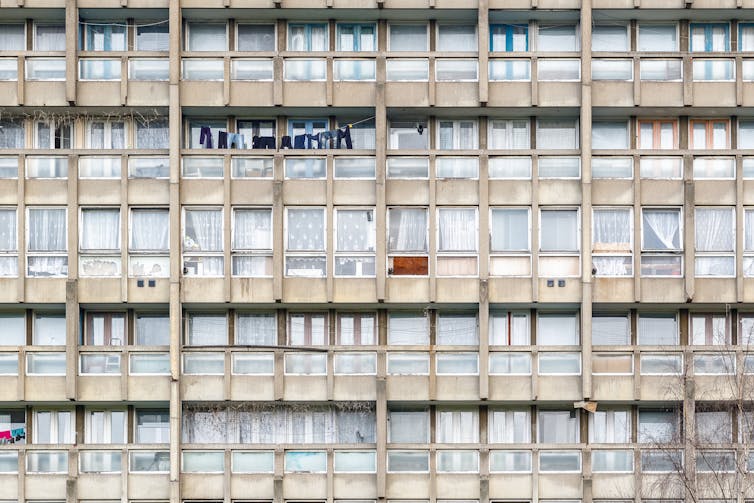Just days after being moved in, people seeking asylum were removed from the Bibby Stockholm accommodation barge due to legionella bacteria on board. Dorset council, where the barge is located, has raised concerns that delays in removing people increased their risk of exposure to the potentially fatal bacteria.
Even before this development, the use of the barge to house people seeking asylum was controversial. This is both because of the impact on the local community, and conditions for the people living on board. The barge has been used in the past to house workers, including military personnel. But when being used for asylum seekers, the cabins on the barge – originally designed for one person and only “slightly larger” than a prison cell – will be used to house at least two.
People seeking asylum will be expected to share their small accommodation with a stranger. This is a situation that few would find desirable. It does not meet the government’s own bedroom standard, which is itself not overly generous.
Crowded conditions such as these are associated with a range of negative health consequences including anxiety, depression and psychological distress. They are also associated with increased risk of respiratory illness, including COVID-19 and tuberculosis, as well as infectious disease.
These diseases include diarrhoea and gastroenteritis. We often hear stories of norovirus, a common cause of gastroenteritis, spreading through other high-density spaces such as cruise ships and resorts. However, these are usually much less densely populated than the Bibby Stockholm is expected to be.
The effect of crowding on health is notable. A review of evidence found that around one-fifth of hospital admissions due to infectious disease in New Zealand were attributable to crowded conditions in the home.
Links between crowding and mental health problems have been established among the general population, but risks are likely higher for those that have recently fled their home country due to the trauma that they have already experienced.
Life in lockdown
Another important difference between the experience of asylum seekers on the barge compared to others that have lived onboard is the restricted movement and high security they will experience. Residents will be unable to freely leave the barge or the nearby containment area.
Like most asylum seekers in the UK, they are prohibited from working, and the very low levels of financial support they receive would severely limit any activities they could take part in. They will probably spend much of their time onboard in their small, cramped rooms (with disconnected TVs) or the limited space onboard.
The lockdowns of the COVID pandemic demonstrated the importance of safe, secure and suitable housing for protecting our health and wellbeing as well as the challenges of restricted movement. People seeking asylum and housed on the Bibby Stockholm will experience lockdown-like conditions, and evidence suggests that lockdown had greater negative effect on those in smaller homes and without outside space.
Read more:
‘Performative cruelty’: the hostile architecture of the UK government’s migrant barge
The facilities on the Bibby Stockholm are not just bleak, but dangerous. The Fire Brigades Union has raised concerns about fire safety on board the vessel, a worry familiar to those that spent lockdown in homes covered in flammable cladding identified after the Grenfell Tower fire.
Further, there are concerns about a lack of life jackets. This worry is likely to be particularly severe for people who may not be able to swim. And for those who may have arrived via a dangerous sea-crossing journey, simply being housed on the water could be traumatic.
Savings, at what cost?
The government has argued that the Bibby Stockholm is needed to save money on housing asylum seekers as it works through the backlog of applications. But there is little evidence for this – and the potential health costs of housing people on the barge could easily wipe out any savings.
Among the general population, the health effects of poor housing in England are thought to cost the NHS £1.4 billion a year. Overcrowding is the third highest contributor to this figure.

I Wei Huang/Shutterstock
While conditions on the barge are particularly likely to harm the health of people living there, many of the issues will also apply to other asylum seeker “containment sites”. The Bibby Stockholm is the latest in a long history of housing asylum seekers in the poorest conditions, including more recent trends of using “quasi-detention” sites, which are isolated, have high security and reduce people’s access to privacy, freedom and legal advice.
Government ministers have said that the use of hotels as temporary housing is a “pull factor” for asylum seekers, attracting them to Britain. Housing is a basic, essential need and shouldn’t be used punitively – as a deterrent or punishment. In fact, any deterrent is unlikely to work, so long as the push factors forcing people to seek asylum in the first place remain.
![]()
Amy Clair does not work for, consult, own shares in or receive funding from any company or organisation that would benefit from this article, and has disclosed no relevant affiliations beyond their academic appointment.











